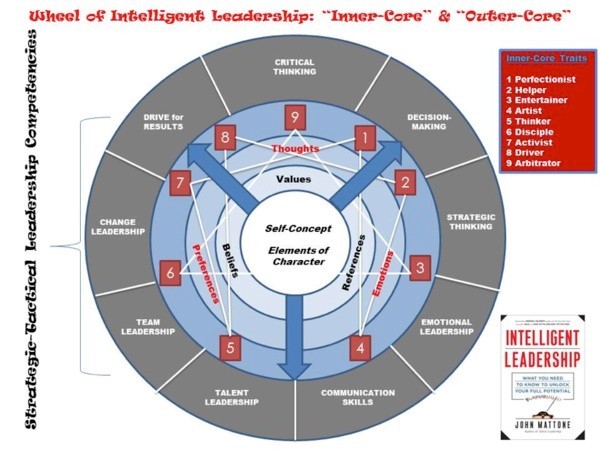THE WORLD’S #1 EXECUTIVE COACHING AND BUSINESS COACHING BLOG SINCE 2017.
Understanding Your Helper Leadership Trait
Published On: October 20, 2016 | Last updated on: October 20, 2016 | Author: John Mattone | Category: Blog, Leadership Maturity
I first developed the Map of Leadership Maturity in 1996 as part of one of my earlier books, Success Yourself, but have continued to shape and refine the “Map” based on my work as a coach with leaders all over the world. My mission is to help leaders and emerging leaders develop the self-understanding necessary to recognize, accept, embrace and take purposeful action to continue to polish and leverage their strengths and address their development needs. My book, Intelligent Leadership (2013) presented these refinements and advancements and all that I had learned about leadership and people since Success Yourself was released. Today’s organizations tend to expect individuals at all levels to be leaders, and it’s certainly required if you want to thrive. But not everyone is ready and willing to take on the responsibilities of leadership that their companies need them to assume.
Using The Map helps you identify your predominant leadership traits and then work to cultivate the most mature characteristics in them. When you’ve cultivated the mature characteristics of your predominant trait, you can work on developing the mature characteristics of all traits that define outstanding leadership. To succeed, you will have to face and address unpalatable truths about yourself and work on ridding yourself of limiting thoughts, emotions, and behaviors. But the results will be worthwhile due to gains in maturity and leadership capability.
The Map of Leadership Maturity distinguishes among nine leadership traits. Your inner core and behavioral tendencies are primarily associated with one predominant characteristic, but everyone demonstrates (to some extent) inner core characteristics and behavioral tendencies linked with other traits too. Over the course of the next nine weeks, I want to provide you with more detail on each of these nine “inner-core” traits including how these traits are manifested in both mature and immature leadership behaviors, how to recognize both the trait (and its’ maturity) in both yourself and others, and then I will offer suggestions on how to drive this trait to higher levels of maturity.

Let’s begin with the Helper Trait. First, an important definition. When I refer to the word “predominant”, I am referring to the highest scoring trait on my assessment, the Mattone Leadership Enneagram Inventory (MLEI). This means that if your highest scoring trait on the MLEI is in fact the Helper, then it is your most active trait of the nine and, therefore, it has more impact and influence on how you behave and are perceived by others. Leaders who are predominantly Helpers according to the Map of Leadership Maturity are often respected because of their strong desire to empathize and to help others. Yet this wonderful attribute can also lead to many of the challenges leaders of this predominant type encounter.

Being a Helper doesn’t mean being happy and enthusiastic 24/7.
Unfortunately, predominant Helper leaders may overexpress positive feelings while dismissing their negative feelings. They consider themselves sensitive and caring leaders, but having their entire sense of self tied up in being sensitive and caring can itself cause problems.
Helper Leaders Who Derail
Leaders are more likely to derail when they have immature ways of responding to stress and change. With predominant Helper leaders, the process of derailing often begins with putting conditions on their acts of caring and kindness. In other words, they start demanding something in return. It may appear as if the derailing Helper leader has to “buy” respect because he is determined to get admiration and respect one way or another. Consequences can include teams that feel guilty if they don’t feel the admiration and respect they know their leader wants, as well as teams that face mounting pressure from leaders. The strings attached to a derailing Helper leader can eventually turn him or her resentful, manipulative, and covertly hostile.
Recognizing Derailing Helper Traits in Yourself
If you are a Helper leader and are derailing, you’ll typically display several revealing behaviors, including:
- Complaining
- Being resentful
- Disguising motives
- Manipulating others in self-serving ways
- Trying to make others feel guilty
- Becoming domineering
- Feeling entitled
- Being disappointed when favors aren’t returned
- Feeling like a victim
- Rationalizing how you respond to the (real or perceived) ingratitude of others
These are signs you need to work diligently on developing maturity as a Helper leader.
Recognizing Middle-of-the-Road Helper Traits
The middle-of-the-road level of maturity in the Helper isn’t running off the proverbial rails, but still has work to do to achieve maturity. These Helper leaders often:
- Talk more about their own feelings than others’
- Talk a good game about respect and admiration, without always demonstrating them
- Demonstrate emotions too intensely
- Overuse flattery
- Can be overly solicitous
- Attempt to control team members
- Court dependence
- Want to be informed about everything, all the time
- Expect ongoing admiration and praise for everything they do

The more a Helper leader demands praise and respect, the less respectful team members tend to feel about him or her.
Recognizing Yourself as a Mature Helper
The mature Helper leader isn’t afraid of, and in fact, prefers close professional relationships. He or she genuinely listens to others, is friendly, and tends to remain steady and calm. Mature Helper leaders share personal feelings on an appropriate level, and often have excellent coaching skills. They’re terrific at handling conflict, are generous and unselfish, and care about others with no strings attached. The mature Helper leader is well-loved for having sensitivity and for going out of the way to help everyone. He or she is genuinely happy about serving others selflessly.
Rising to Higher Levels of Leadership Maturity for Helpers
Working toward maturity as a predominant Helper requires that you must come to terms with the presence of negative feelings and learn to be emotionally honest. When you do this, you can relate more honestly with others and avoid playing games where respect has conditions attached. When you learn to do this, you will be given respect and admiration because you have earned it, not because you “keep score” and demand respect for your accomplishments, and not because people feel “guilted” into it. The mature Helper lets his or her quality of service stand on its own merits and doesn’t manipulate others into paying grudging respect.
What the Mature Helper Leader Has to Offer
Even the mature Helper leader will be uncomfortable with conflict, but they know that sometimes conflict leads to greater maturity. Helper leaders of maturity are often the leaders that people want most to work with because of their selflessness and genuine sense of caring for others. This leader isn’t interested in dividing and conquering, but in uniting and working together to make projects succeed and make things better for everyone. I strongly encourage you to check out my book Intelligent Leadership, which helps you understand your predominant leadership style and develop it to its fullest maturity. And I invite you to learn more about my other services as well, all of which speak to leadership and cultural transformation in business as key elements of creating a strong, flourishing business culture.

